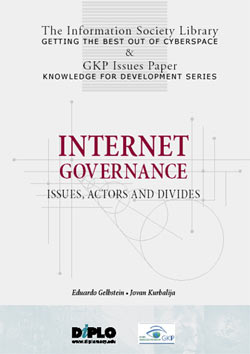
Robert Guerra kindly handed me three books back when we met in Sevilla. One of them was Internet Governance. Issues, Actors and Divides, by Jovan Kurbalija and Eduardo Gelbstein. As the authors themselves state, there are at least five dimensions to Internet issues: Infrastructure, Legal, Economic, Development, and Socio-cultural. Each one is discussed in the chapters that follow
.
Personally, I find the book really interesting and, honestly, much broader in scope and depth than an initial understanding of governance might bring to one’s mind. Actually, I’d compare it to Chris Nicol’s ICT Policy: A Beginner ’s Handbook as they share most of the aim, being Internet Governance. Issues, Actors and Divides more recent, and, indeed, going some steps further than Nicol’s. Both books make, in my opinion, a perfect pair to have a good overview — and something — on what is the Internet and how it does affect me. In other words: they both represent perfect e-awareness raisers.
Taking the book as a toolkit, and quoting again:
The main purpose of such an Internet Governance Toolkit would be to:
• organise the tools currently used in the Internet Governance debate;
• create additional cognitive tools;
• facilitate the inclusive nature of the Internet Governance process by providing interested parties with the tools to understand the issues, positions, and developments.The Internet Governance Toolkit consists of:
• patterns and approaches;
• guiding principles;
• analogies.
Perspectives associated with Internet Governance
[image taken from the book]
Concerning the part of development and the digital divide, this table is of special interest to me:
ICT does NOT facilitate development:
• The “network externalities” help firstcomers establish a dominant position. This favours American giants so that local firms in emerging economies would be effectively frozen out of ecommerce.
• The shift in power from seller to buyer (the Internet inevitably gives rise to “an alternative supplier is never more than a mouse-click away” scenario) will harm poorer countries. It will harm commodity producers mainly from developing countries.
• Higher interest in high-tech shares in rich economies will reduce investor interest in developing countries.ICT facilitates development:
• ICT lowers labour costs; it is cheaper to invest in developing countries.
• Very fast diffusion of ICT across borders occurs, compared to earlier technologies. Previous technologies (railways and electricity) took decades to spread to developing countries, but
ICT is advancing in leaps and bounds.
• The opportunity to leapfrog old technologies by skipping intermediate stages such as copper wires and analogue telephones encourages development.
• ICT’s propensity to reduce the optimal size of a firm in most industries is much closer to the needs of developing countries.
While the list is not complete, it does give some good hints on what is happening on the developing countries arena.
More info
- Book page
- Downloadable version